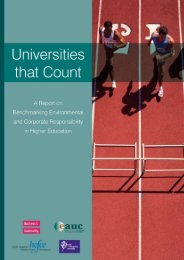Mental health of students in higher education
Mental health of students in higher education - Royal College of ...
Mental health of students in higher education - Royal College of ...
- No tags were found...
Create successful ePaper yourself
Turn your PDF publications into a flip-book with our unique Google optimized e-Paper software.
College Report CR166International <strong>students</strong>’ attitudes to, and expectations <strong>of</strong>, mental<strong>health</strong> services will reflect the diversity <strong>of</strong> experience that they br<strong>in</strong>g fromtheir home countries. At one end <strong>of</strong> the spectrum, <strong>students</strong> from the USAwill <strong>of</strong>ten come to the UK on multiple medications for depression, ADHDand other psychiatric diagnoses. The threshold for medication use <strong>in</strong> suchconditions <strong>in</strong> the USA tends to be lower than <strong>in</strong> European countries (Zitoet al, 2008). A UK psychiatrist or GP will <strong>of</strong>ten come under considerablepressure to support cont<strong>in</strong>ued prescription <strong>of</strong> these medications even if he/she doubts the wisdom <strong>of</strong> this. Students from North America may also haveextensive experience <strong>of</strong> counsell<strong>in</strong>g and therapy and expect that this will beeasily accessible. On the other hand, <strong>in</strong> other cultures there is sometimesa high level <strong>of</strong> stigmatisation associated with mental illness. Students maybe reluctant to admit to mental distress and to seek help. In some cases,psychological problems will lead to ‘somatisation’, that is the expression <strong>of</strong>psychological distress <strong>in</strong> the form <strong>of</strong> physical symptoms such as headaches,<strong>in</strong>somnia and gastro<strong>in</strong>test<strong>in</strong>al symptoms.International <strong>students</strong> will not usually be familiar with the work<strong>in</strong>gs<strong>of</strong> UK mental <strong>health</strong> services. They may not have a clear understand<strong>in</strong>g <strong>of</strong>the various roles <strong>of</strong> psychiatrists, psychologists, counsellors, communitypsychiatric nurses and others. They may also have misapprehensions abouthow to ga<strong>in</strong> access to treatment.With regard to social relationships, <strong>in</strong>ternational <strong>students</strong> are mostlikely to associate with <strong>students</strong> from their own country. Fail<strong>in</strong>g this, theytend to make friendships with other <strong>in</strong>ternational <strong>students</strong>. They are leastlikely to associate with local <strong>students</strong>.There are four broad ways <strong>of</strong> relat<strong>in</strong>g to a majority culture:assimilation: the person becomes as much like the majorityculture as possible<strong>in</strong>tegration: adjustment to the majority culture and adoption <strong>of</strong>some <strong>of</strong> its aspects while reta<strong>in</strong><strong>in</strong>g the attitudes and behaviour <strong>of</strong>the student’s culture <strong>of</strong> orig<strong>in</strong>traditional approach: the student reta<strong>in</strong>s primary identificationwith his/her orig<strong>in</strong>al culture and rejects the majority culturemarg<strong>in</strong>alisation: the student becomes socially isolated, reject<strong>in</strong>gboth orig<strong>in</strong>al and new cultures.There is some evidence that <strong>students</strong> do best with <strong>in</strong>tegration or thetraditional approach. Those who attempt to assimilate fully seem to do lesswell and those who become marg<strong>in</strong>alised do worst <strong>of</strong> all.Students whose first language is not English can be at a disadvantage<strong>in</strong> relation to others. If English language pr<strong>of</strong>iciency is <strong>in</strong>adequate, this canlead to a range <strong>of</strong> problems. The most obvious <strong>of</strong> these is a detrimentaleffect on academic performance. Students may f<strong>in</strong>d it difficult to understandlectures, take notes and complete assignments such as essays. Theymay underperform <strong>in</strong> exam<strong>in</strong>ations. They can f<strong>in</strong>d it difficult to speak up<strong>in</strong> tutorials or to ask questions. A poor grasp <strong>of</strong> English can also make ithard for <strong>students</strong> to <strong>in</strong>tegrate <strong>in</strong>to the host culture and to engage <strong>in</strong> social<strong>in</strong>teractions.Vacations can create problems for <strong>students</strong> who are unable to returnhome. The Christmas vacation may be especially difficult. There may bedeadl<strong>in</strong>es for exam<strong>in</strong>ations or course work. The <strong>in</strong>ternational student maybe faced with cold, w<strong>in</strong>try weather and short days for the first time <strong>in</strong> his/62 http://www.rcpsych.ac.uk





